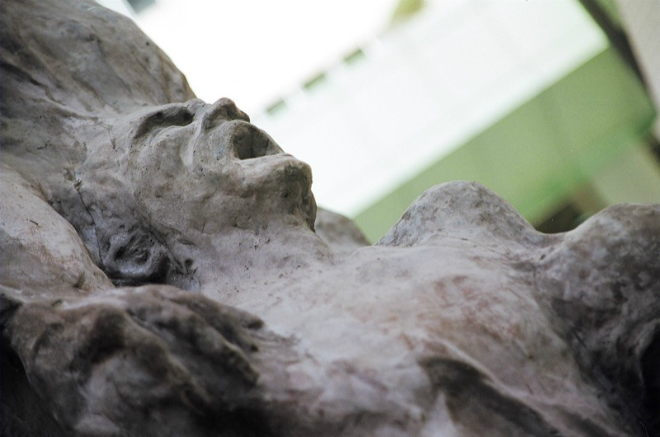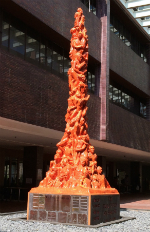
“We’re not supposed to eat on the buses,” David Wong said, eying the bags of chips in my arms, “but….”
“You’re opening it, then. If I open it, it might start a riot.”
Wong laughed, but he understood and opened the bag.
***
Our bosses at an academic program for gifted children at the University of Hong Kong never told us about the political relations between the Hong Kongers and “the Mainlanders.” It was better that way. If I had gone in knowing, expecting, I would’ve only looked for the hostility. I would’ve missed out on the colorful memories I have from this summer. I would’ve lost my sense of humor.
When I finally escaped the airplane I’d been sitting on for 15 cramped hours, I was shamefully unaware of all politics between China and the “special administrative region” of Hong Kong. Unaware that Hong Kongers were concerned that their chief executive was too close with Beijing. Unaware that they wanted suffrage.
Unaware that earlier this summer, Beijing stated in a white paper that “the high degree of autonomy enjoyed by Hong Kong is subject to the central government’s authorization.” China has since said that it would try to be more tactful in the future.
But erected in the middle of HKU’s campus is a statue of naked humans whose faces are contorted in agony. Their orange bodies twist into the shape of a flame. Its modest name is “The Pillar of Shame.” Its drama even made me feel a bit embarrassed.
The Pillar of Shame is a memorial for the victims of the Tiananmen Square Massacre, during which the Chinese government used violent military force to end a pro-democracy protest.
Only a few weeks before the program started, tens of thousands of Hong Kongers took to the streets for their annual pro-democracy protest. It is their way of “celebrating” the day the British handed Hong Kong to China.
***

“It is so hot here,” the counselor onstage declared in her Southern accent. “I was thinking, they shouldn’t call it Hong Kong, they should call it Hot Kong.”
The kids loved it. A couple of hundred of them, most of them from Hong Kong, broke into high pitched giggles and laughter. One of them raised his hand and declared, “It’s not Hot Kong, it’s Air-Pollution-From-China-Hot Kong!”
The kids, not all of them, but most of them, cheered. My coworkers, mostly non-Asian and from the States, didn’t understand and laughed uncertainly. I arched an eyebrow. These preteen boys were still scared of sitting next to the girls on the bus, but they could aim political jokes at some of the people sitting in the room. My coworkers were baffled.
***
I liked that Hong Kong seemed be going through an identity crisis. Skyscrapers towered over white-columned colonial buildings, nestled on a beautiful hillside. A breakfast of Spam, eggs and toast came with a side soup of an Asian broth (why they drink soup in that heat and humidity, I will never understand). Many of my Hong Kong students spoke English with a British accent.
Hong Kong was handed over to the British in 1842, when China lost the First Opium Wars. In the early 20th century, many Chinese fled to Hong Kong to escape the political turbulence of domestic and international politics. These are the grandparents of some of the Hong Kongers of my generation.
On July 1, 1997, the British returned Hong Kong to China as a "Special Administrative Region.” As a SAR, Hong Kong enjoys the principle of “One Country, Two Systems”: while Hong Kong is indeed a part of China, it has some degree of autonomy.
This allows them to have, for example, freedom of speech. But for many it is not enough. Every year on July 1, they celebrate “Hong Kong Special Administrative Region Establishment Day” (my Hong Kong friends referred to it as, thankfully, “Hong Kong Day”) with a pro-democracy protest. These protests have seen peak numbers of participants in years like 1989, when the SAR turned out in support of the victims of the Tiananmen Square Massacre.
On July 1, 2014, the University of Hong Kong estimated that over 100,000 Hong Kongers turned out for the annual protests. This time, they were angry about the white paper from Beijing. They want universal suffrage for their next elections.
Otherwise, they would protest again in the fall for what they pre-emptively decided to call “Occupy Central with Love and Peace,” in Central, Hong Kong’s financial district.
But the protests on Hong Kong Day 2014 were about more than just universal suffrage. It was about 2008, when contaminated milk and sick infants compelled Mainlanders to rush to purchase all of Hong Kong’s milk powder. It was about Mainlanders giving birth to babies in Hong Kong hospitals so that they could have Hong Kong citizenship, supposedly leaving no room for expecting Hong Kong mothers.
It was about pollution. It was about luxury bags. It was about crowds.
On August 31, when I was back in the states, China’s legislature decided against open elections for Hong Kong’s chief executive. That day, the Hong Kongers once more took to the streets.
***
The kids could not guess my race, which, because I was Chinese, was never a problem in the States. “We thought you were from Hong Kong!” they’d exclaim.
“Korean? Japanese? Thai?”
“Nope.”
***
Wong, my closest friend in Hong Kong, was one of those protesting on Hong Kong Day, just a month before I met him at work. He had recently graduated from an American university.
One afternoon, Wong, another RA and I went to a hole-in-the-wall noodle soup shop near campus for lunch. Next to it was another hole-in-the-wall restaurant with a Michelin star. I don’t know why we didn’t go to the restaurant with the star.
Wong told us about the protest, and about the potential for Occupy Central. His voice became more heated as he spoke of all of Hong Kong’s grievances.
One time, he said, a Mainlander ate a cup of noodles on the MTR. Hong Kongers don’t follow many rules, but no one eats on the MTR. So the Hong Kongers on the train became angry – angry that the Mainlanders were coming into the their city, crowding their streets and dirtying the MTR with spilled noodle soup. The video of the fight that ensued went viral, enraging both Chinese and Hong Kongers alike.
The three of us discussed what should be done, what could be done. I had taken a protest and social change class with Dr. Aldon Morris last spring. I’d discussed the tragic Tiananmen Square protests in a class on modern Chinese with Dr. Peter Carroll in the winter. I’ve learned that there are so many ways a protest can fail.
As we sat in that tiny shop, sipping on milk tea and slurping noodles, trying to solve this convoluted political, cultural and historical problem that we knew we could not solve, the electricity cut out and all became dark.
***
“Is this an American summer camp?” asked a 14-year-old girl who worked for her dad at University of Hong Kong. She helped me clean up the beads that I’d spilled on the hardwood floor after an activity session with the students.
“Yeah,” I replied, thanking her for her help. “They’re mostly middle schoolers, so they can be difficult!”
“Well, at least they’re not a bunch of Mainlanders,” she laughed sympathetically. I am the child of two Mainlanders, so I blushed, and said nothing.
***
I slowly became more sympathetic with the Hong Kong cause.
But as I became more sympathetic, I became painfully aware of my status as an indirect Mainlander. I became borderline paranoid. I didn’t want to represent all the atrocities of China if I ate a bag of chips on the bus. I spoke excessively politely, and apologized often.
When my parents stopped by Hong Kong after a class reunion in the Mainland, they told me about a confrontation my dad had with a young man on the MTR. My dad had asked the man for directions, the man flatly asked him if he were a Mainlander. My dad said yes, and the man, in short, responded that my mother, grandmother and father were not welcome in this already-crowded place.
I was annoyed, and a little embarrassed. “Why did you tell him you were a Mainlander?” I asked.
I hated myself for wishing that my dad had lied about his identity.
My parents hated their visit to Hong Kong. I pointed out that one should expect Hong Kong to be polite by Chinese standards. My mother said bitterly, “If they think they’re so Western and British, they should act like it.”
***
The night before I flew back to the States, I caught a cab to the mall where Wong and I decided to grab dinner. In Mandarin, the cab driver told me light-heartedly that he hated Mainlanders. He also told me that he hated Americans. I confessed to him that in Hong Kong I sometimes felt self-conscious about saying I was a Mainlander.
He misunderstood. “You are Chinese, you hear? You are not American. The Japanese thought they were Americans too, and then they got thrown into those camps. Never say that you are American.”
***
One time at dinner, one of my girls came to the table with her tray of food and slammed it down on the table.
“The cashier gave me the wrong food!” she fumed. “I bet she knew that I was a Mainlander.”
Uh-oh. “That’s not true,” I said half-heartedly.
“It is true!” she insisted, her voice reaching that high pitch of distraught desperation. She’s only 12. “Hong Kong people hate Chinese people right now!”
My older girls from Hong Kong murmured denials, and I ended the conversation with another lame statement.
But sometimes, I wish I had let them continue their discussion. Maybe it could have taught them how to hold healthy conversations about controversial topics. Children have a way of figuring things out, a black-and-white wisdom that makes you think, “Well, duh.”
The students are naïve. Though they might hurt each other with political slurs they’ve heard their parents say, I don’t think they really know what it means to have an identity and to fight for it. One time, a well-respected American colleague asked Wong and me whether or not Asians had “manners.” She had seen her Asian students during dinner eat meat and spit the bones out onto their trays. It’s what my parents do at home as well.
Wong cut me off with a diplomatic answer before I give a more hotheaded response. Later, he admitted to me that he was bothered by the question. Manners, he said, indicated our humanity. They separate humans from animals.
The kids don’t know that, of course. They don’t speak the language of identity and politics. They don’t know that milk powder is synonym for thievery (or generosity). That ramen on the MTR is a verb: to disrespect. That the way they eat is an adjective: animalistic. That hatred and oppression is the Pillar of Shame they walk and play by everyday.
But everyday, they’re growing up. And the better they become at speaking the language, more things will be lost in translation.